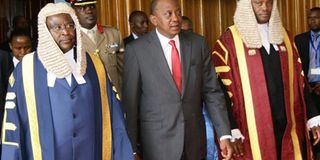I expected the case to be dropped, Uhuru Kenyatta says

President Kenyatta is escorted by Senate Speaker Ekwee Ethuro and Speaker of the National Assembly Justin Muturi on arrival at Parliament to address a special session of MPs and Senators on October 6, 2014. PHOTO | BILLY MUTAI |
What you need to know:
- The ICC has charged Uhuru as an indirect co-perpetrator of the 2007-8 post-election violence.
- Mr Kenyatta said the ICC Prosecutor had in the past told the court that she did not have sufficient evidence to prosecute him.
“I wish to reiterate that my conscience is clear, has been clear and will remain forever clear that I am innocent of all the accusations that have been levelled against me,” President Uhuru Kenyatta said on Monday when he addressed a joint session of the National Assembly and Senate ahead of his status conference at the International Criminal Court in The Hague on Wednesday.
Mr Kenyatta, who has been charged with crimes against humanity, told the legislators that he was shocked on December 15, 2010 when he watched as his name was read out on TV as one of the six leaders who bore the greatest responsibility for the 2007-8 post-election violence.
According to the Waki Commission of Inquiry into the violence, 1,133 people were killed and more than 650,000 displaced.
The President said when he was named as one of those who bore the greatest responsibility for the violence, “this was the beginning of my long journey to defend my name in the face of these serious allegations.”
The ICC has charged him as an indirect co-perpetrator. He faces five counts of crimes against humanity: murder, rape, forcible transfer of population, persecution and other inhumane acts.
According to the court, the crimes were committed between January 24 and 28, 2008.
The case information sheet published by the court and updated on September 26, states that “the attacks in or around Nakuru and Naivasha resulted in a large number of killings, displacement of thousands, rape, physical injuries, mental suffering and destruction of property”.
It also states that between November 2007 and January 2008, Mr Kenyatta and Mungiki members “created a common plan to commit these attacks” with the aim of keeping the Party of National Unity (PNU) in power “in exchange for an end to government repression and protection of Mungiki’s interests”.
INSUFFICIENT EVIDENCE
But on Monday, Mr Kenyatta said the ICC Prosecutor, Ms Fatou Bensouda, who took over the case from Mr Luis Moreno-Ocampo, had in the past told the court that she did not have sufficient evidence to prosecute him.
“The prosecutor has, since last December, and as recently as last month, admitted to the judges that the available evidence is insufficient to prove alleged criminal responsibility beyond reasonable doubt,” said Mr Kenyatta.
According to him, Ms Bensouda’s admission did not come as a surprise.
Quoting one of the ICC judges, Mr Kenyatta said: “The prosecution failed to investigate the case in accordance with the statutory obligations.”
He was referring to one of the opinions delivered by Judge Christine Van den Wyngaert, who, in April last year, criticised the prosecution’s conduct in the case.
She had said that the prosecution violated its obligation to fully respect the rights of persons arising under the Statute. The judge later requested to be excused from hearing the case.
On Monday, Mr Kenyatta said he had expected the case to be dropped in the wake of Ms Bensouda’s admission, but was surprised when the prosecution turned its focus on the government, accusing it of failing to provide evidence.
At the end of his speech, he announced that he had handed over power to his deputy, Mr William Ruto, who will act as president as he, Mr Kenyatta, travelled to The Hague as a private individual.




